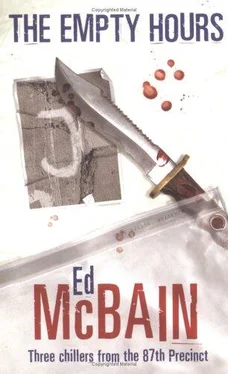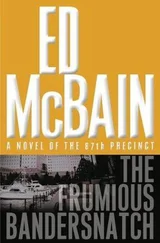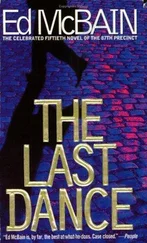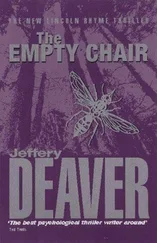Now he sat drinking insipid tea and wondering why it was so quiet. He supposed the lull had something to do with Easter. Maybe there was going to be an egg-rolling ceremony down South Twelfth Street tomorrow. Maybe all the criminals and potential criminals in the 87th were home dyeing. Eggs, that is. He smiled and took another sip of the tea. From the clerical office beyond the slattered rail divider which separated the squadroom from the corridor, he could hear the rattling of Miscolo’s typewriter. Above that, and beyond it, coming from the iron-runged steps which led upstairs, he could hear the ring of footsteps. He turned toward the corridor just as Steve Carella entered it from the opposite end.
Carella walked easily and nonchalantly toward the railing, a big man who moved with fine-honed athletic precision. He shoved open the gate in the railing, walked to his desk, took off his jacket, pulled down his tie and unbuttoned the top button of his shirt.
“What happened?” Hawes asked.
“The same thing that always happens,” Carella said. He sighed heavily and rubbed his hand over his face. “Is there any more coffee?” he asked.
“I’m drinking tea.”
“Hey, Miscolo!” Carella yelled. “Any coffee in there?”
“I’ll put on some more water!” Miscolo yelled back.
“So what happened?” Hawes asked.
“Oh, the same old jazz,” Carella said. “It’s a waste of time to even go out on these wife-beating squeals. I’ve never answered one yet that netted anything.”
“She wouldn’t press charges,” Hawes said knowingly.
“Charges, hell. There wasn’t even any beating, according to her. She’s got blood running out of her nose, and a shiner the size of a half-dollar, and she’s the one who screamed for the patrolman — but the minute I get there, everything’s calm and peaceful.” Carella shook his head. “‘A beating, officer?’“ he mimicked in a high, shrill voice. “‘You must be mistaken, officer. Why, my husband is a good, kind, sweet man. We’ve been married for twenty years, and he never lifted a finger to me. You must be mistaken, sir.’“
“Then who yelled for the cop?” Hawes asked.
“That’s just what I said to her.”
“What’d she answer?”
“She said, ‘Oh, we were just having a friendly little family argument.’ The guy almost knocked three teeth out of her mouth, but that’s just a friendly little family argument. So I asked her how she happened to have a bloody nose and a mouse under her eye and — catch this, Cotton — she said she got them ironing.”
“What?”
“Ironing.”
“She said the ironing board collapsed and the iron jumped up and hit her in the eye, and one of the ironing board legs clipped her in the nose. By the time I left, she and her husband were ready to go on a second honeymoon. She was hugging him all over the place, and he was sneaking his hand under her dress, so I figured I’d come back here where it isn’t so sexy.”
“Good idea,” Hawes said.
“Hey, Miscolo!” Carella shouted. “Where’s that coffee?”
“A watched pot never boils!” Miscolo shouted back cleverly.
“We’ve got George Bernard Shaw in the clerical office,” Carella said. “Anything happen since I left?”
“Nothing. Not a peep.”
“The streets are quiet, too,” Carella said, suddenly thoughtful.
“Before the storm,” Hawes said.
“Mmmm.”
The squadroom was silent again. Beyond the meshed window, they could hear the myriad sounds of the city, the auto horns, the muffled cries, the belching of buses, a little girl singing as she walked past the station house.
“Well, I suppose I ought to type up some overdue reports,” Carella said.
He wheeled over a typing cart, took three Detective Division reports from his desk, inserted carbon between two of the sheets and began typing.
Hawes stared at the distant lights of Isola’s buildings and sucked in a draught of mesh-filtered spring air.
He wondered why it was so quiet.
He wondered just exactly what all those people were doing out there.
Some of those people were playing April Fool’s Day pranks. Some of them were getting ready for tomorrow, which was Easter Sunday. And some of them were celebrating a third and ancient holiday known as Passover. Now that’s a coincidence which could cause one to speculate upon the similarity of dissimilar religions and the existence of a single, all-powerful God, and all that sort of mystic stuff, if one were inclined toward speculation. Speculator or not, it doesn’t take a big detective to check a calendar, and the coincidence was there, take it or leave it. Buddhist, atheist, or Seventh Day Adventist, you had to admit there was something very democratic and wholesome about Easter and Passover coinciding the way they did, something which gave a festive air to the entire city. Jews and Gentiles alike, because of a chance mating of the Christian and the Hebrew calendars, were celebrating important holidays at almost the same time. Passover had officially begun at sunset on Friday, March thirty-first, another coincidence, since Passover did not always fall on the Jewish Sabbath; but this year, it did. And tonight was April first, and the traditional second seder service, the annual re-enactment of the Jews’ liberation from Egyptian bondage, was being observed in Jewish homes throughout the city.
Detective Meyer Meyer was a Jew.
Or at least, he thought he was a Jew. Sometimes he wasn’t quite certain. Because if he was a Jew, he sometimes asked himself, how come he hadn’t seen the inside of a synagogue in twenty years? And if he was a Jew, how come two of his favorite dishes were roast pork and broiled lobster, both of which were forbidden by the dietary laws of the religion? And if he was such a Jew, how come he allowed his son Alan — who was thirteen and who had been barmitzvahed only last month — to play Post Office with Alice McCarthy, who was as Irish as a four-leaf clover?
Sometimes, Meyer got confused.
Sitting at the head of the traditional table on this night of the second seder, he didn’t know quite how he felt. He looked at his family, Sarah and the three children, and then he looked at the seder table, festively set with a floral centerpiece and lighted candles and the large platter upon which were placed the traditional objects — three matzos, a roasted shankbone, a roasted egg, bitter herbs, charoses, watercress — and he still didn’t know exactly how he felt. He took a deep breath and began the prayer.
“And it was evening,” Meyer said, “and it was morning, the sixth day. Thus the heaven and the earth were finished, and all the host of them. And on the seventh day, God had finished his work which He had made: and He rested on the seventh day from his work which he had done. And God blessed the seventh day, and hallowed it, because that in it He rested from all his work, which God had created in order to make it.”
There was a certain beauty to the words, and they lingered in his mind as he went through the ceremony, describing the various objects on the table and their symbolic meaning. When he elevated the dish containing the bone and the egg, everyone sitting around the table took hold of the dish, and Meyer said, “This is the bread of affliction which our ancestors ate in the land of Egypt; let all those who are hungry, enter and eat thereof, and all who are in distress, come and celebrate the Passover.”
He spoke of his ancestors, but he wondered who he — their descendant — was.
“Wherefore is this night distinguished from all other nights?” he asked. “Any other night, we may eat either leavened or unleavened bread, but on this night only unleavened bread; all other nights, we may eat any species of herbs, but on this night only bitter herbs ...”
Читать дальше












